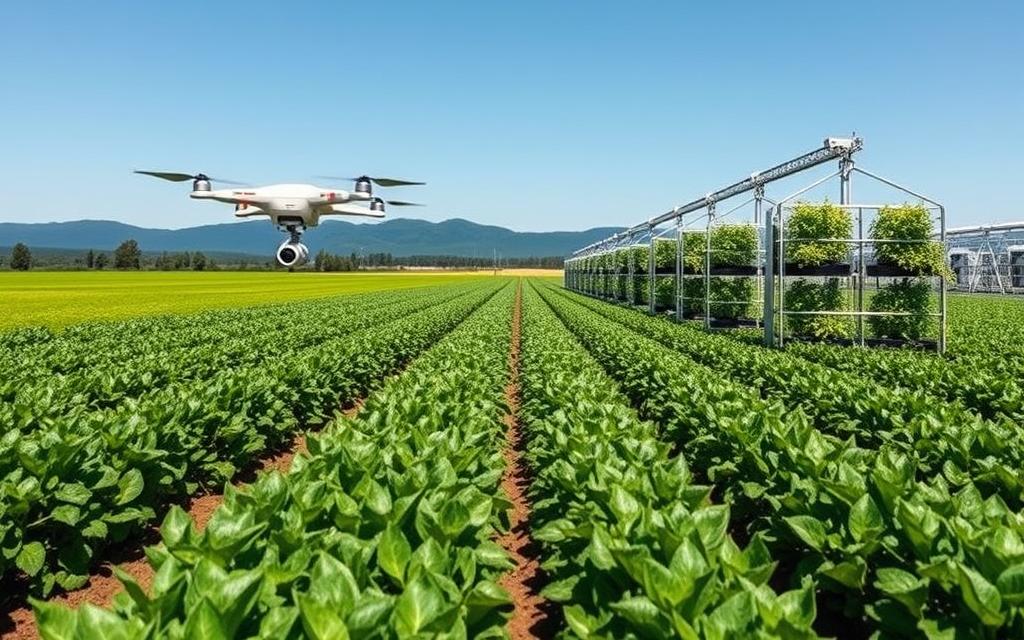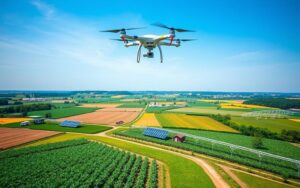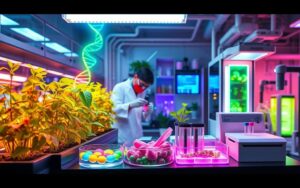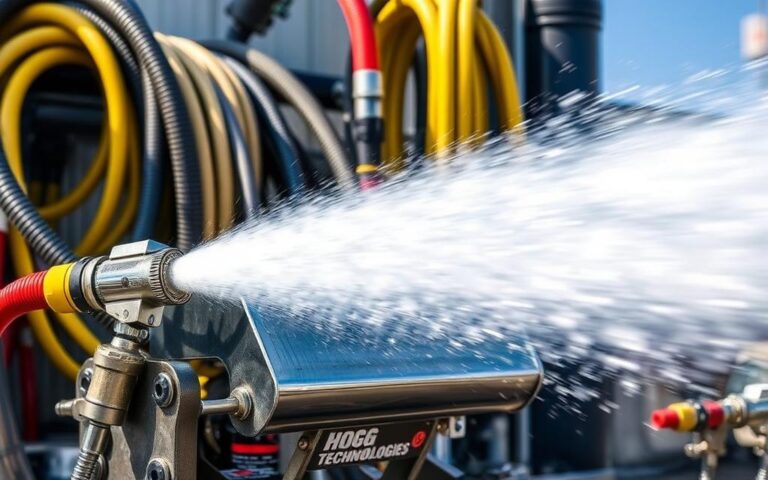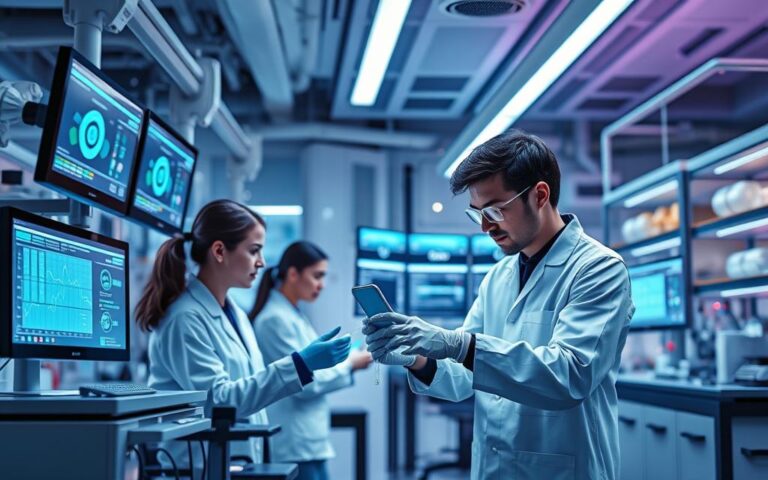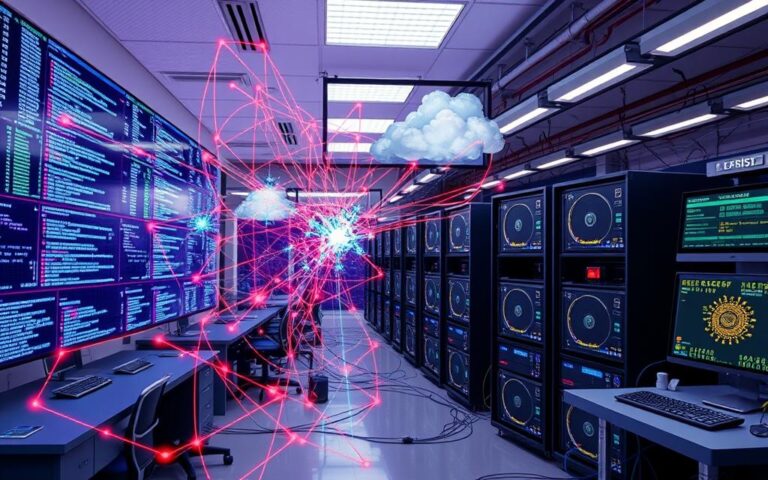Ways Technology Enhances Food Security
With more people in the world, food security is becoming more essential. Traditional farming can’t always provide enough safe and healthy food. Technology is now key in tackling the issues agriculture faces globally. Since the 1960s, the Green Revolution helped double food production using better crops and irrigation. Today, precision farming technology helps us use resources wisely and grow more food.
Beyond this, biotechnology has been revolutionary, creating genetically modified crops like Bt cotton and corn. These crops use fewer pesticides and have better quality. Technology isn’t just about increasing how much food we can grow. It also helps us farm in ways that are good for the planet. This article explores how technology is making farming more resilient and sustainable for the future.
The Importance of Food Security
Food security is about ensuring everyone has access to enough safe and nutritious food all the time. It is crucial for global stability and supporting communities. With the world facing a food crisis, understanding and improving food security is vital.
Definition and Global Significance
Food security means more than just having enough food. It includes access, use, and steady food supplies. Things like conflict, climate change, and economic troubles can hit food security hard. This can lead to problems such as malnutrition, poverty, and inequality, especially in developing countries where it’s tough to implement food security plans.
The Interconnected Factors Impacting Food Security
Different factors are essential for keeping communities fed. For instance, better irrigation in sub-Saharan Africa can improve water use. Reducing food waste after harvest can also help, especially with crops like cassava and sweet potato. Also, new technology gives people more food choices, boosting nutrition.
The world’s population could grow by 2 billion in the next 30 years, making food security even more of a challenge. Climate-smart farming is crucial for ensuring food and nutrition keep up with changes. Focusing on women’s roles in food security shows how social factors impact many lives. It highlights the need for policies that support everyone in farming.
New technologies can fuel economic growth and make food systems better, which helps with food security. For example, apps like AfriScout help pastoralists find water and pasture. Food security’s role in global health is also key, as poor diets can lead to obesity and diseases, even when there’s enough food.
How Technology Addresses Agricultural Challenges
Global food needs are growing quickly. To address this, we’re turning to cutting-edge technologies. Developing new crop types has been a big leap forward. These crops yield more and fight off pests and diseases better. This improves how much food we can grow. Methods like biotechnology and crossbreeding create crops that handle tough conditions, such as drought and salty soil. This helps ensure we have enough food. For more on how tech plays a vital role, check out this resource.
Innovative Crop Varieties and Their Role in Productivity
AI has changed how we develop new crop types. These crops are designed for specific soil types, increasing harvests and being kind to the planet. Plus, precision agriculture uses data to use resources wisely. Farmers make better choices. AI helps speed up creating tough crops, boosting output to meet the world’s food needs.
Utilising Technology for Pest and Disease Management
Pest management has improved with AI. Better monitoring spots pests early, so we can act fast to save crops without using too many pesticides. Drones help with pollination in places with few natural pollinators, increasing harvests. AI also makes watering and feeding crops more precise, saving resources and making farms run better.
How Can Technology Improve Food Security
Technology plays a key role in making food more secure. It does this by making farming more efficient. Two key areas are precision agriculture and using data for better decisions. These methods help farmers do more with less and cut down on harm to the environment.
Precision Agriculture: Maximising Resource Efficiency
Precision agriculture helps farmers manage resources better with high-tech tools. Technologies like GPS, drones, and IoT devices let them track and manage things like water, fertilisers, and pesticides precisely. This method is based on real-time data. It helps farmers use resources wisely and farm more sustainably.
Data-Driven Insights for Enhanced Decision-Making
Data-driven farming gives farmers important information to help them decide what to do. More farmers using digital tech means better access to market information. They get to know about the weather, soil health, and how well their crops are doing. This makes it easier to improve their harvests and food security.
Adding software solutions, including SaaS models, makes farming more efficient and cost-effective. Organizations like SourceTrace, working in many countries, show how tech can help manage resources better. This move boosts food production and helps fight hunger. It’s especially important for smallholder farmers, who produce nearly 70% of the world’s food.
| Technology | Benefits | Impact on Food Security |
|---|---|---|
| Precision Agriculture | Optimises resource use | Enhances productivity and sustainability |
| SaaS Solutions | Cost-saving and resource efficiency | Improves access to markets and data |
| Data Analytics | Informed decision-making | Boosts crop yields and reduces hunger |
By using precision agriculture and data, farmers can help deal with the food crisis. This ensures that enough resources reach those who need them most.
The Role of Biotechnology in Enhancing Food Security
Biotechnology is key in making food security better by finding new solutions. With more people in the world, we need more food. That’s why we must farm in ways that keep the planet healthy. Genetically modified crops, for example, make farming more sustainable. They help crops grow stronger and produce more.
Genetically Modified Organisms and Crop Improvement
Genetically modified organisms, or GMOs, have changed farming a lot. They make crops that can handle bugs, diseases, and bad weather better. Crops like Bt cotton and Bt corn don’t need as many chemicals to protect them. This means they produce more food that we can rely on. Countries like Argentina are leading in using these new farming methods.
Countries that are still developing played a big part in using these crops, too. They used 24% of the biotech crops grown worldwide in the early 2000s. This shows how important GMOs are worldwide.
Biotechnology’s Contribution to Sustainable Farming
Biotechnology helps farming become better for the environment. Deals between companies like Monsanto and countries help make these technologies available to more farmers. Big investments in research aim to make farming even better. The Rockefeller Foundation and others are working on projects like “Golden Rice.” This project shows how biotech can make food more nutritious and help with food security.
Small farmers are very important in this. Many grow genetically modified crops that are stronger and yield more. By using biotechnology in farming, we can produce more food. This helps keep our environment healthy and ensures we have enough food for everyone in the future.
| Aspect | Impact of Biotechnology |
|---|---|
| Crop Resilience | Improved resistance to pests and diseases, leading to increased productivity. |
| Resource Efficiency | Reduced use of chemical pesticides and fertilizers, promoting sustainable practices. |
| Nutritional Improvement | Enhanced nutritional content in crops, contributing to better health outcomes. |
| Access for Farmers | Public-private partnerships facilitating technology transfer to farmers in developing countries. |
Food Preservation Techniques Through Technology
Recent years have seen great advances in food preservation technology, especially in refrigeration and safe packaging. These innovations help keep food fresh and safe. They also make food last longer and cut down on waste. By using modern methods, we can improve food security around the world.
Advancements in Refrigeration and Storage Solutions
Technology has significantly improved how we keep perishable goods fresh from when they are produced until we eat them. One key method is High-pressure processing (HPP), a type of cold pasteurization. It destroys harmful germs like Salmonella and Listeria. This keeps the food safe while maintaining its taste and texture.
Intelligent storage systems are another leap forward. They use the Internet of Things (IoT) and sensors for continuous monitoring. This way, they can keep storage conditions ideal.
The Impact of Packaging Innovations on Food Safety
Packaging has become smarter at stopping bacteria and fungi, greatly improving how long food stays fresh. Vacuum packaging, for example, prevents air from getting in and stops microbes.
Today’s technology also uses special compounds that lock in moisture but keep out oxygen, keeping produce fresh twice as long. Artificial intelligence (AI) helps ensure that what we buy is safe and good to eat.
| Technology Type | Function | Benefits |
|---|---|---|
| Cold Pasteurization (HPP) | Inactivates pathogenic microorganisms | Ensures food safety, extends shelf life |
| Intelligent Storage Systems | Real-time monitoring of storage | Optimises conditions, reduces waste |
| Vacuum Packaging | Reduces microbial growth | Significantly extends freshness |
| AI and Data Analytics | Enhances quality control | Improves safety and consumer trust |
The Integration of Information and Communication Technologies
Information communication technology has changed farming in big ways. It lets farmers use mobile apps to get the latest market news, weather, and prices. This helps smallholder farmers decide what’s best for them. They can grow more food and earn more money.
This new tech means healthier food for everyone. Farmers knowing more leads to better food security.
Utilising Mobile Apps for Market Access and Support
Mobile apps are crucial for farmers to understand the market. They give instant updates and help farmers learn from each other. This boosts how much food they can grow.
Such tech helps farmers meet market needs quickly. It also helps them farm in ways that last. The importance of this technology grows as more people face hunger.
Enhancing Extension Services through Digital Platforms
Digital platforms are changing how farmers learn. They use tech to fill in knowledge gaps. Extension workers can now give advice quickly through these platforms.
This change means better services and more farmers learning. This new method will help fight hunger, especially with more people to feed soon.
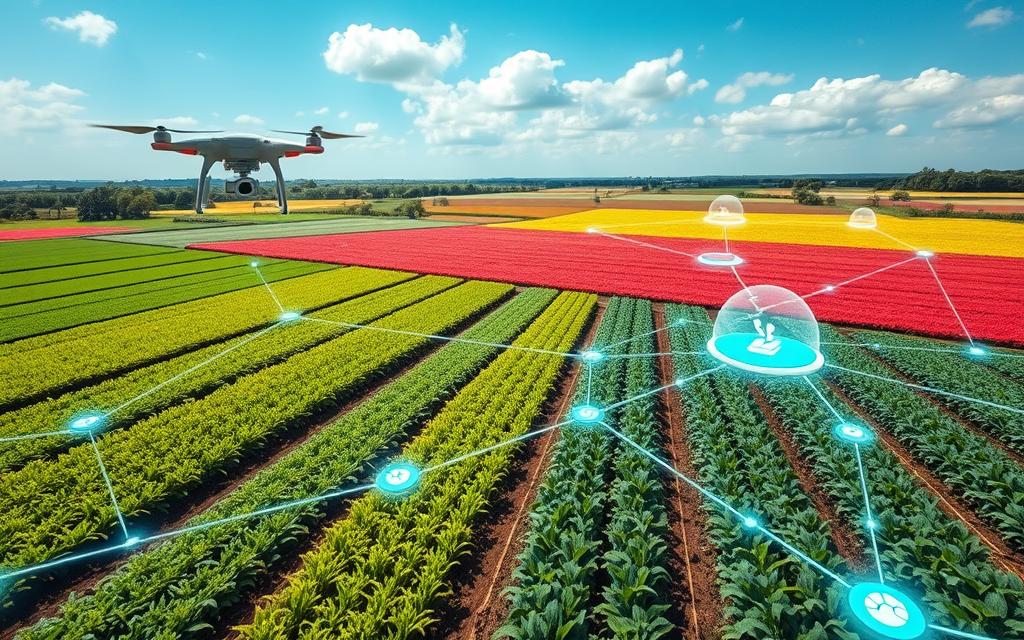
Conclusion
Technology is changing agriculture, making food more secure. With the world’s food needs possibly doubling by 2050, new farming methods are vital. Precision farming and biotechnology boost crops and make farming sustainable. This is crucial as we deal with climate change, more people, and less resources.
Technology’s role in farming is huge. For example, China led in crops in 2009 thanks to tech. In Singapore, where most food is imported, smart tech helps reduce food waste. In 2018, Singapore threw away over 763,100 tonnes of food. These cases show how vital technology is for food security.
Investing in agriculture research is essential for the future. Private investment has grown, and venture capital is flowing into food tech. But, to make the most of tech for food safety, we need fair policies and training. Everyone should benefit from these advances, aiming for a future where everyone has enough food.
FAQ
What is food security?
Food security means everyone can get enough good food all the time. It helps people live active, healthy lives. It looks at how much food is available, who can get it, and its nutritional value. It aims to beat hunger and poverty.
How does technology enhance agricultural productivity?
Tech helps farming by creating better crop types. These crops yield more and can handle tough weather. It also includes precision agriculture. This approach uses detailed data to improve how we use resources like water.
What role do genetically modified organisms (GMOs) play in food security?
GMOs help grow crops that resist pests and harsh weather. This makes sure we have enough food. It’s key for keeping food supplies steady and safe.
How does precision agriculture work?
Precision agriculture collects data through GPS and drones. This helps farmers use water and fertiliser more smartly. It’s about being efficient, which ups production and cuts down on waste.
What advancements are being made in food preservation technology?
New cool tech and storage keep food fresh longer. This lowers food waste and keeps what we eat safe. It’s vital for getting food to everyone safely and efficiently.
How can mobile apps benefit farmers?
Mobile apps give farmers info on markets, weather, and prices. This helps them make better decisions. It can boost their profits and support food security.
Why is the integration of technology vital for sustainable agriculture?
Tech in farming helps tackle big issues like climate change. It makes sure we can keep feeding people into the future. It’s about farming that’s good for the planet and for us.
What factors influence food security globally?
Food security is affected by how much food we grow, market access, climate, politics, and economic conditions. We need to solve these problems to stop world hunger.
